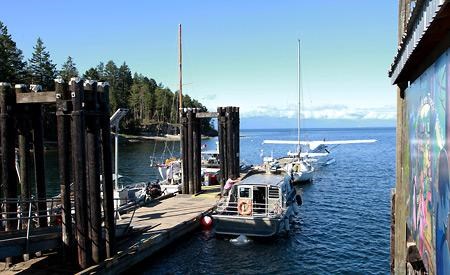Some Lasqueti Islanders fail to see the emergency in upgrading communications for first responders.
At the Thursday, February 26, Powell River Regional District board meeting, the bylaw to amend the Emergency Telephone Extended Service to include the participation of Electoral Area E (Lasqueti Island), was postponed until the March 26 regional board meeting. Adoption of the bylaw would provide islanders with 911 emergency service but the one-time taxation assessment, plus the desire by some islanders to live off the grid, has rankled some residents.
During the board meeting, Al Radke, the regional district’s chief administrative officer, said it was important to bring the matter back to the board because it was approaching the final opportunity to finalize what is in the budget this coming year.
“We have to determine by the next board meeting if money is in the budget or not,” he said.
A day earlier, during the regional district’s committee of the whole meeting, Merrick Anderson, Electoral Area E director, said people from the island were upset that the 911 service was being “forced down their throats.” He said it was felt there was insufficient public consultation about the initiative.
The problem began in June 2014 when Telus advised it was phasing out its pager service that had been used by the fire department on the island. Anderson said the fire chief and Ryan Thoms, manager of emergency services for the Powell River Regional Emergency Program, reviewed alternatives, options were found, and an application was submitted to the 911 emergency system serving the Powell River area. In December, the regional district received information indicating that Lasqueti Island could be a participant.
“It wasn’t until the middle of January that we actually passed a bylaw to do that,” Anderson said.
“I have to wear that I did not notify the public sufficiently,” he said. “I did assume that the fire department of 25 first responders and their families all talking about it would get out on the island.”
Adoption of the 911 system would mean a one-time tax increase of $75 per $100,000 of assessed value on Lasqueti Islanders’ taxes.
A meeting was held on Lasqueti Friday, March 13, with representatives from the regional district and 911 in attendance.
“People were somewhat upset but it was an excellent presentation,” Anderson said.
Anderson said it is clear that adoption of the 911 system would solve “sketchy” communications on the island. However, islanders were still upset with the initiative and Anderson received a number of phone calls from angry residents.
He called Radke and asked if there was any way to put the brakes on it. Radke said the bylaw had been signed and it was going to happen.
At an earlier public meeting, Anderson said one speaker indicated that Lasqueti is a “different community” and that people living there “accept the risk.”
Anderson said he was served with a petition requesting that third reading of the bylaw be rescinded so there could be further discussion.
“I am beseeching you, on behalf of my Lasqueti community, to put the brakes on the whole process and let them talk about it,” Anderson said to his colleagues at the board meeting. “Whether that’s legally possible, I don’t know, but I’ve pled their case.”
Anderson said there is an alternative to carry on with a pager system similar to the one Telus is retiring. There is a company in Victoria that is offering a similar service.
Anderson said there was some irony in the matter because the islanders were “all freaked out” about being put on the 911 grid.
“The existential view of the Lasquetians is they are an off-the-grid community,” Anderson said. “The irony is they are all on the World Wide Web, which pinpoints their whereabouts immediately.”
Colin Palmer, Electoral Area C director, said the problem for him was the liability. He asked what the liability would be if the regional district rescinded the bylaw and somebody dies.
Radke said if something was to go wrong, the regional board wears the whole liability risk for exposure.
Patrick Brabazon, Electoral Area A director and regional board chair will accompany Anderson, Radke and Thoms, and meet with the islanders to receive more input on the issue.



